Sudabeh Mohafez, Stuttgart (D)
Sudabeh Mohafez was born in Teheran in 1963 and lives in Stuttgart. Mohafez was suggested as Klaus Nüchtern's competition sponsor.
Download text in:
Word file format (*.doc)
PDF file format (*.pdf)
Information on the author
Videoportrait
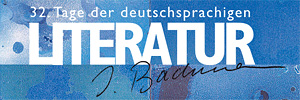
Sudabeh Mohafez
In the Red Sea
Later I'll know, that it was a deflagration in front of the fire, but now I don't know the word yet, only hear the noise, that it denotes, that is, it sounds like a pop!, definitely pop! That's what woke me up.
And, the fireman says afterwards, the young one with the scratches in his face, it's a miracle. Is what he says. That my survival is a miracle, and that it's absolutely to do with the deflagration, he says that too. Because if you hadn't heard it, I mean, if you hadn't woken up because of it... And I hear the three little dots as clearly as the pop! during the night, that is: because he doesn't like to say the word. The young fireman with the scratches in his face doesn't like to say the word - dead. That is I would be dead now, that is gone, that is a corpse or the charred remains of a corpse, if the deflagration hadn't woken me up. He says all that, but he only says it a couple of hours later, when only cold, black smoke is coming from the house and a stench of charcoal and chemicals, when four of the five fire engines have left again, that's when the young fireman with the scratches will say the bit with the little dots.
Now it's still velvety dark in the flat, as well as outside. There's only this murmuring, and I'm not dreaming, but I'm wide awake and run after the murmuring, towards the roaring. With every step the murmuring grows louder and louder and turns to hissing and roaring and is coming from the stairwell.
Open the apartment door. It's burning on the outside, that means: a surface 3 feet by 6 feet 10 inches, which is perpendicular to the floor and is now standing ajar at an acute angle, is ablaze. The wooden wall to the left is burning and the floor in front of my door, and it's a fact, that at this moment I'm thinking. I'm thinking about water, about a blanket to suffocate the flames. I'm thinking about protection. But hardly have I slammed the door shut, a garland of lights. Where it is aligned with the frame the door has suddenly acquired a fiery decoration. It crackles. I run back into the bedroom. It's very hot. The fig tree beside the bed, like a firework: spraying sparks. The wooden wall between the bed and outside is gone. Red sea, no: White, yellow, red. Ocean coloured. And a bluish flickering sometimes, briefly. No fish, crabs, sea urchins, only a hissing, like that of snakes. The hissing of the very last remnants of dampness in the ancient floorboards. Then the window panes in the kitchen and the bathroom burst.
My apartment is on fire. I say it softly, carefully, very precisely: My apartment is on fire. I step out onto the balcony, pull the door to from outside, look through the window into the apartment, no: in ocean colours, iridescent, and it's a fact, that I also think now at this sight. I think about what this sentence means. What does, my apartment is on fire, mean and, my apartment, what does that mean?
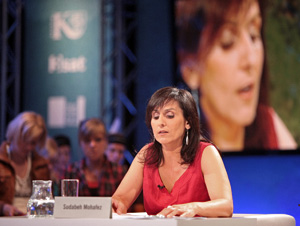
The fire brigade comes. Aluminium ladders are leaning against the wall to left and right of the balcony. The get the people out of the attic flats first. They have pushed the upper parts of their bodies right out of their windows, because: above them a stream of dark black smoke incessantly pours out and flows upwards, yes, exactly that: a dark black stream of smoke flowing out, and above me Frau Naumann is climbing onto the ladder in her pumps, and it looks as if the fireman is embracing her, but he's standing a couple of rungs further down and is only holding his arms around her like a round, wide cage and isn't touching her. He's protecting her. He's protecting her from falling down, and for the second time during the night I'm thinking about protection and that I would like to kiss this fireman.
It's a fact, that I think that very seriously. I would like to kiss this fireman, because he is holding his arms around Frau Naumann like a round cage, who is standing on the ladder in her pumps and the skin tight stretch jeans and her platinum blonde perm and the plum red ladies quilted anorak and is now descending the ladder with her, at her, Frau Naumann's pace, and I think, that I have to learn to think quite differently. That love is something quite different from what I have thought up to now, because: from now on I know exactly what it feels like when I love someone. It feels like this. The way I feel, when I see the fireman with his arms and Frau Naumann, like that, exactly like that, so that she doesn't fall down, that's why, and so that she's as little afraid as possible, because: even when things are very bad, someone can try, so that a little less fear comes up, and that's love. Because he doesn't rush her, and he doesn't tug at her and he doesn't shout at her and doesn't say Faster! Faster!, and he doesn't say either Now get a move on, there's still another two up there! He simply always places one foot on the next rung, when Frau Naumann does so, and it almost looks as if they're dancing, and I briefly consider, whether I should ask him what his name is, right now when he passes me, so that afterwards I can ask for him and kiss him, but then the pane in the balcony door cracks and for the second time tonight I mutter My apartment's on fire, and it's a fact, that already at this moment I'm no longer thinking about what that means.
Then I start. Someone is breathing beside me. It's not the fireman I would like to kiss. It's different one. He points to a ladder which is leaning against my balcony. There's yet another fireman standing on the ladder. I turn away from the ocean, that means: I turn away from the crackling and bursting behind the panes and climb onto the ladder and climb down, and the fireman on the ladder holds my arm tight, and I think, that he's not such a good dancer as the fireman I want to kiss later on. Then the ladder has come to an end. Then I'm standing at the bottom, on muddy ground, crushed grass. Then the fireman pushes me over to a police van, at last lets go of my arm, and I stand and look.
To my left the house: cowers. Like a fire-spewing, choking thing, because: choking on smoke, that has been beaten to death, almost beaten to death, because it's still coughing, groaning, and a big, red fireman wave is surging up to it, that means: there are now two oceans. One that kills and one that saves.
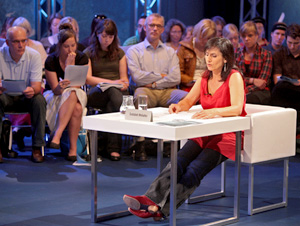
The police van is a fug space mixed of sweat and Lenor and sleep and alcohol and smegma and fear. I go down the narrow passage between neighbours' knees and sit down, and then the air is thick. The air is suddenly in my throat, like a pillar of solid, grey-flecked granite, and Jessica from the ground floor, Jessica who is five years old, says I'm thirsty, and Herr Manteuffel from the second floor is cursing softly to himself, and I'm going to suffocate or burst right now, that means: I stand up abruptly and go outside and breathe smoky air and stand between white-red obliquely striped ribbon. That there's red, I only know, I don't see it, because it's still night, but I know that the dark stripes on the tapes are red. White-red obliquely striped cordon tapes, behind them people. Fifty people? Eighty meanwhile? The house is only smoking now, but more and more people and blue light patrols moving, dark patches between them. And a hand. It's on my shoulder, pushes me in the direction of the police van. I shake my head. It smells of Lenorsleep there, I whisper to the hand and am something that can be turned around and pushed. You don't mean any harm, I explain to the man with the hand. Who doesn't mean what kind of harm? You, I say and nod in his direction. Me? He removes his hand. Yes, I say. I don't mean any harm at all! I know, I say. The hand again, it's pushing. I resist it. You really should go back to the police van. I pull my shoulder away from the hand. Where is the fireman? I ask. I am the fireman, he says. No, I say and look around. Yes, he says and places his hand on my shoulder again and pushes again, and I duck away from his hand again and look for the fireman I want to kiss later on, and can't make him out with all the men in safety orange running about and should have asked what his name was. What's your name? I ask. Will you please go back to the van now? he says. But what's your name? I ask. What does it matter, what my name is? he says, and I look at him, because: astonished at his clever question. It doesn't matter at all, I say and nod. It's not you I want to kiss. What's that? he says, and I walk away. Where are you going? he asks. To breathe, I say. You want to breathe, he says. I nod. You can breathe in the van too, he says. I look at him. He is very stupid. I walk up and down, and the hand disappears, and the man to whom it belongs, disappears with it, and I sit down on a bollard at the edge of the grass in front of the house and breathe, and then, quite suddenly, I discover him and jump up and run over, and as I dive into the sea of rescuers the fireman whom I would like to kiss: he's already disappeared again.
I stand in the middle of the fireman ocean and am a rock, around which the ocean surges, draws back, rushes forward. I dive gazedeep, that means: I only dive into the ocean with my eyes and don't find him. No one touches me, instead they give me a wide berth, around me to the right, to the left, depending on where they're coming from and where they're going, single-mindedly, all of them, with hoses and axes and ropes, and someone says I'll go part of the way with you, if you want. Perhaps over there? He points to the bollard, on which I had been sitting, and only points and doesn't push and doesn't turn me around either, and my hand is on his arm, and I lay my head on his shoulder, and he says: nothing at all, but puts his other arm around my shoulders, and we are a rock, around which the ocean surges, and the ocean divides around us, round to the right and to the left, and no one touches us. We are a rock, which is moving through the ocean and knows exactly where it wants to go, that is: to the bollard at the furthest edge of the whitered obliquely striped frame, and I have no idea how one can walk at all if one is a rock in this entwined way, but we can: we are a rock, which can do that, and come to the bollard and sit down on the grass in front of it, and: say nothing.
What's your name? I ask after the silence, and he says Gelling, Heinz-Jürgen Gelling, and I laugh and say Heinz-Jürgen Gelling, did you know that you are a rock? He smiles at first, then looks serious and says Sometimes I'm a rock, and sometimes I'm not a rock. Then he looks to the side, and I too look to the side, because: two men are coming towards us.
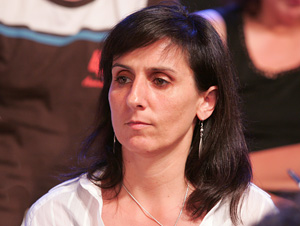
No, I say. The pair look understandingly, and they look: unyieldingly. No, I say once again. It's unpleasant, says the smaller man with the walrus moustache, but unfortunately it's necessary. I'm not going there, I say. We're checking whether anything's missing, in case it was a robbery, he says. I say No. I say It wasn't a robbery. I say I was in my apartment, until you came, no one could get in, there was only ocean everywhere. Ocean, he says, and I nod The red sea and the smoke. The red sea, he says, and Heinz-Jürgen Gelling says The fire, she means the fire. The fire was everywhere, you mean? asks the man, and I nod, and he rubs his temple and runs his fingers under his yellow safety helmet. What's your name? I ask. Schulze, he says, I already said so, Chief Inspector Schulze, Fire Investigation. It wasn't a robbery, Herr Schulze, I say, and there's no reason. No reason for what? asks Inspector Schulze, and Heinz-Jürgen Gelling rolls his eyes. To go into the apartment again, he says, there's no reason to do that. Inspector Schulze looks at me. I am a stubborn thing, which he looks at patiently, with a trace of exhaustion in his patient gaze. It's always hard for the victims, he says, particularly for the victims of a fire, but it has to be done. I am a stubborn, exhausting thing of a fire victim, and Heinz-Jürgen Gelling says I'll come with you, if you want, and I turn towards the house and look at the coughing window holes and think, that I don't know this place, and that I have nothing to do with it, and consider, what would happen, if I really, and only because Heinz-Jürgen Gelling would be ready to come with me, went there, into this strange place, into this smoke spewing, foam extinguisher soaked cave of the environs of a fire, into which Inspector Schulze wants to drag me, and I am a stubborn, exhausting fire victim, whom one has to bring around to do what is her duty, that is: inspection of the scene of the accident.
If you want, I'll come with you, says Heinz-Jürgen Gelling once again, and this time I nod, because the way he says it, means something, that is: you won't be able to get around it. I must go into the strange place. But I don't have to enter it alone, instead Heinz-Jürgen Gelling will enter it with me, and I consider, how one becomes a rock, which can walk, when one has to go into the strange place, and Heinz-Jürgen Gelling takes my hand, and he doesn't smile, but looks me in the eye, and I believe, that he looks in a way, that means, that he's sorry, that he would prefer not to force me to take this step. But sometimes, says his gaze, one has to go into the strange place.
I would like you, says Inspector Schulze, to look round carefully and tell me everything that strikes you. If something is missing or if you see something, that doesn't belong to you, he says and disappears into the dark hole in front of us, and it seems he is doing something with his feet, that is, scratching sounds from the floor in the hole darkness. It sounds like grit on muddy paths in winter, like grit being pushed back and forward by big, heavy shoes. But Heinz-Jürgen Gelling is standing. He's waiting for me, because I'm standing and because I'm stretching my head forward a little and looking. Into the hole. Into the darkness. I'm coming with you, he says, and I tell my leg, that it should lift up and take a step forward. You must, I say to my leg. You won't get around it, I say to my leg, and my knee does something, and my hips do something, and my leg takes a step forward, and Heinz-Jürgen Gelling is beside me, and we walk slowly into the hole darkness, and a yellow cone wanders over the strange landscape. It is Inspector Schulze's hands that move it along.
In the strange place banister rails stick up black-brown in the air like small, sick pines. They are of varying heights and are briefly lit up by yellow, wandering cones of light, as by searchlights, then they disappear again. In the strange place Inspector Schulze stands on something that looks like the third or fourth step of something, that looks as if it had once been a flight of stairs. In the strange place steel rails with crudely punched holes are lying across what were once steps, and we are supposed, that means: Heinz-Jürgen Gelling and I are supposed to go upstairs on these rails, and I balance carefully up the iron incline to the first floor of the strange place, and Heinz-Jürgen Gelling is close behind me and says look ahead of you. You must see as far as the half-landing and I look forward and scream, because suddenly Inspector Schulze's belt is hanging in front of my face and his voice is thundering over me. A helmet! thunders Inspector Schulze's voice, and his stomach bounces up twice and down twice under the open jacket and above the belt. A helmet for the girl! Gelling, what have you got in your head? Heinz-Jürgen Gelling pushes me forward and past Inspector Schulze, and six feet in front of me lies a mattress, black, smouldering. Between it and me there's nowall, beside the mattress, a book carcass, a lamp carcass, a tree corpse. Looks like a fig, I say to Heinz-Jürgen Gelling, and he says Yes, like a fig. Someone presses a helmet onto my head. Is it yellow or white? I ask Heinz-Jürgen Gelling. Orange, he says and smiles, and then he says Suits you, and I say Thanks.
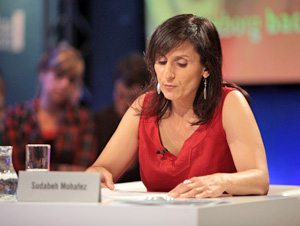
This way, says Inspector Schulze, and we follow him into a small room. The cooker is black, the sink is black. A scorched kitchen cabinet with splintered glass panes in the top section, black, still smoking. At right angles in front of the window a wooden table, remains of chairs above holes in the floorboards. Is anything missing? asks Inspector Schulze. Is something missing, I mutter. And? he say. Is something missing? No, I say. Good, he says and nods, satisfied, and walks past us into what was once a hall, and we slowly follow him, and he has disappeared, but then he sticks his head out of the next door frame, and we go to him and into the room, and I immediately go back into what was once a hall, because I don't want to see, what I've seen, and Heinz-Jürgen gelling pushes his arm under mine, and Schulze! he says, that's enough. She can't deal with it, he says. He says it quietly, firmly. He says it like a king. He also says it like a little boy, who is watching his guinea pig die.
Pear-shaped, I say. Yes, says Heinz-Jürgen Gelling, and now his voice is once again his quite normal Heinz-Jürgen Gelling voice. It's turned pear-shaped, I say, and again Heinz-Jürgen Gelling says Yes. Then he coughs. Then he says That happens, when the temperatures are very high. What he's saying, sounds logical. It sounds like reality. It's all right, I say because of that, and Heinz-Jürgen Gelling and Inspector Schulze look at me. I'll go in with you again, I say, and Heinz-Jürgen Gelling says Sure? And I nod, and Inspector Schulze says There you are, after you! and lets us go first, and I don't even look at the left-hand wall, but only look at the bath tub, which is black, and I only look at the floor, which is black, that means: I see three carcasses, that is: a towel carcass, a toothbrush carcass, a bath mat carcass, and I don't even look one little bit at the gigantic pear drop to the left of me above the toilet, and Inspector Schulze asks Is something missing? And I say No. And he says Good, and we don't have to go into the next room, because it doesn't exist. There are only four walls and nofloor and noceiling, instead when one looks up, one sees the rafters above Frau Pietzsch's apartment. No, I say, and Inspector Schulze looks at me inquiringly. No? he says. Yes, I say, no. Which is it? he says. No, I say, nothing's missing, and point at the room that doesn't exist, and Heinz-Jürgen Gelling laughs quietly, and Inspector Schulze makes an odd noise with his tongue or with his teeth, and I say, Listen, Heinz-Jürgen Gelling, it'll soon be morning, and turn my head, because: a bird is singing, and Heinz-Jürgen Gelling listens and smiles, and we go into a room that does exist. In the room that does exist, there is, what I've already seen from the stairs, because there was nowall. There's a mattress, which is smouldering, a book carcass, a lamp carcass, a tree corpse. Heinz-Jürgen Gelling bends down. He picks up a postcard from the floor. In the middle of this ash-rained, extinguisher foam encrusted strangeness he has found an unblemished postcard. Take it with you, I say, and Heinz-Jürgen Gelling pulls down the zip of his protective jacket and shoves the card into the dark warmth in front of his chest. And? asks Inspector Schulze. No, I say, and the inspection of the scene of the accident is over, and we go step by step back through the strange place and out and to the bollard.
It's a miracle, says Heinz-Jürgen Gelling, and only now do I notice the scratches on his face. There must have been a deflagration, he says, and I nod, when he says that, because: I can remember the sound. The wall between the bed and the stairwell was no more than an old door papered over, he says, and I nod again. It must have burned up immediately, and with the smoke formation, that is, without the deflagration, he says, if you hadn't heard that, if you hadn't woken up because of it... And I hear the three dots as clearly as the POP! a couple of hours earlier, because: he doesn't like to say the word. Heinz-Jürgen Gelling doesn't like to say - dead. But I would like to say it, and I say it. If I hadn't woken up because of it, I say, then I would be dead now, that is, gone, that is, a corpse or the charred remains of a corpse, and Heinz-Jürgen Gelling looks me in the eye and: says nothing.
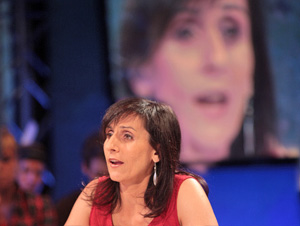
Perhaps I somehow attracted the accident, I say into his silence, and he suddenly looks at me in a way which makes me fall silent. That's not a helpful thought, he says. That's complete nonsense, he says and should stop looking at me like that. That's why I don't say anything more about attracting accidents, but talk about something entirely different. The pear shape, I say, used to be a flow heater, and Heinz-Jürgen Gelling holds his breath. Then he releases it again slowly and nods and says, that is: as if he had been sleeping, dreaming perhaps, and had only just changed over to the waking world and not at all cross any more, with such a voice he says Yes, a flow heater, and pulls out the postcard and looks at the sunflower on it. Sometimes, he says, in the middle of the greatest destruction, one finds something that has remained untouched. Unscathed, he says. Perhaps it isn't unscathed at all, I say, and Heinz-Jürgen Gelling looks astonished and holds the card up. Not a speck of dust on it, nothing, he says. Sunflowers are yellow, I say, this one here has lost all its colour. It's a black and white picture, says Heinz-Jürgen Gelling. But perhaps it wasn't always a black and white picture, I say, and the card disappears inside his jacket again and he sighs and stands up, and Come with me, he says.
The police van is empty. We'll wait inside, says Heinz-Jürgen Gelling. He leaves the door open, so that I can breathe better. You have to have a place to stay now, he says. There are two possibilities. Either, you give the police an address and are driven there. Then he's silent and fiddles with a loose thread dangling from a seam of his protective jacket. I'm waiting for the other possibility, but Heinz-Jürgen Gelling continues to say nothing. Or? I say finally. Yes, says Heinz-Jürgen Gelling, then..., and clears his throat. If you can't give an address, he says, after he has cleared his throat and after he doesn't look at me at all, instead now looks at the metal floor of the police van, then the police will drive you to the nearest shelter for the homeless. Shelter for the homeless, I say very quietly and very precisely, and I believe, my voice sounds astonished. I'd rather not go there, I say. Very few do, he says and notes down the address I give him.
Then Heinz-Jürgen Gelling says I have to go. Where to? I ask. My shift's over he says. The incident's over, he says. You're on an incident, I say, and he says I'm a fireman. I'm here, because I'm on an incident. And now the incident is over, I say, and he nods, and I consider, what that means, that is: I'm part of Heinz-Jürgen Gelling's incident and that's why I am, what the incident is, that is: over, and I put my head to the side, because I don't at all know, how to part, when one has been a rock, that can walk, and is now a fireman, whose shift is over, and a fire victim, who is going to be driven away in a couple of minutes.
That's it then, says Heinz-Jürgen Gelling and clears his throat and points to the policeman in front of the police van and looks at the floor as he holds out his hand. And I see his hand and take it and squeeze it carefully, and he squeezes my hand just as carefully and stands up. All the best, he says, goes to the door of the police van, jumps out, and doesn't turn round once, but instead: disappears, and I sit and breathe and look at my hand, and not until later, much later, will it occur to me, that I've forgotten to kiss him.
Translated by Martin Chalmers

